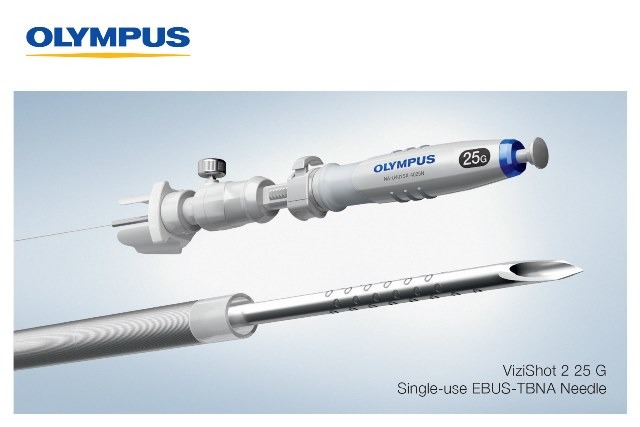
Olympus, a global technology leader in designing and delivering innovative solutions for medical and surgical procedures, has announced the launch of the ViziShot 2 25 G needle for Endobronchial Ultrasound Transbronchial Aspiration (EBUS-TBNA).
This device is a part of the Olympus EBUS Solution which offers a comprehensive solution for diagnosing and staging lung cancer. The Olympus EBUS system is the only solution recommended for both lymph node sampling and peripheral lesion detection.
“As the only company manufacturing and selling both bronchoscopes and needles, Olympus is proud to expand our EBUS-TBNA product family portfolio with the 25 G EBUS-TBNA needle. Our comprehensive pulmonary solutions bring great value to our physician customers striving to advance diagnosis and staging capabilities for lung disease and lung cancer,” said Lynn Ray, Vice President, General Manager, Global Respiratory, Olympus.
EBUS-TBNA, a procedure used in the diagnosis and staging of lung cancer, allows physicians to visualize diseased tissue, lymph nodes or lesions beyond the walls of the airways. Samples from parts of the lymph node that require further investigation can be taken using a specialized aspiration needle.
The ViziShot 2 25 G, is the smallest gauge size of the Olympus EBUS-TBNA needle portfolio. Benefits of the smaller lumen and enhanced design features of the 25 G needle include:
High Quality Samples: Even with a smaller lumen, the needle is able to obtain sufficient quantities of high-quality specimen needed for establishing a diagnosis and reliable staging.
Increased Accessibility during EBUS-TBNA: The small diameter of the 25 G EBUS-TBNA needle enhances scope angulation leading to increased accessibility, and flexibility and of difficult-to-reach lymph nodes.
Improved Puncture Capabilities: This needle requires less puncture force to the sample due to the curved edge back-cut needle tip design feature.
Clear Target Visualization: Clear ultrasound echogenicity is maintained due to the dimpled needle design.
“A 25-gauge needle is something I have always wanted available in our lab,” said Ramyar Madhavi, MD of Keck School of Medicine of the University of Southern California. “From our point of view, the needle tip is sharper; it handles easily and provides a more than adequately sized, high-quality specimen. Having this needle allows me to feel more comfortable when proceeding with EBUS on patients for whom discontinuing anticoagulant therapy is not an option.”
Among both men and women, lung cancer is the leading cause of cancer-related deaths in the U.S., according to the Centers for Disease Control and the American Cancer Society. It is estimated that over 370 Americans will die each day from the disease in 2020.1 Since the announcement of new lung cancer screening recommendations for high-risk patients by the U.S. Preventive Services Task Force in July 2013, we have seen a 5 percent decline in lung-cancer related deaths2, lending evidence to the effectiveness of early diagnosis and accurate staging of lung cancer.
Source: Company Press Release






